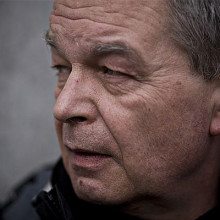Polish literature

Paweł Smoleński
(born 1959) – foreign correspondent, feature writer and journalist. Since 1989 he has worked for the leading daily newspaper, Gazeta Wyborcza, and before that he worked for the underground press. He won the Polish-Ukrainian Reconciliation Award 2003 for his book Burial of a Butcher.
As befits a first-class foreign correspondent, Smoleński seeks out places where there is friction, countries torn apart by conflict, divided societies whose problems, most often originating in the past, cast a dark shadow across the present and the future. In Burial of a Butcher he endeavoured to describe present-day Polish-Ukrainian relations, which, in the words of Ryszard Kapuściński, are still branded by the “bad memory” of the crimes committed by both Ukrainians and Poles during the Second World War and in the post-war era. Smoleński has gathered the opinions of people who, despite the fact that the war ended decades ago, still cannot break free of the whirligig of hatred and refuse to hold out a hand in reconciliation, as well as those who, mindful of the dismal past, are determined to rebuild good neighbourly relations between Poland and Ukraine. Using a similar method, i.e. by demonstrating the rationale of various sides in the conflict, in Iraq – Hell in Paradise he describes the situation in Iraq following the fall of Saddam Hussein’s regime, and in Israel Isn’t Flying Any More he depicts the situation in Israel.
Smoleński’s reportage is colourful, stunning and gripping, primarily because he avoids journalistic generalisations, limits the authorial comments and does not put himself in the foreground. He is interested in the life stories of the people who make politics happen as well as those of entirely ordinary people. He carefully collects and arranges them, and it is only through this mosaic of human stories, accounts and opinions that the real issues emerge, sometimes as a distinct pattern within that mosaic, sometimes as little more than a blurred shadow. In this way he invites his readers to join the debate and encourages them to consider the issues described in his reportage for themselves. And only the best reporters manage to do that.
BIBLIOGRAPHY
- Pokolenie kryzysu, Instytut Literacki, Paryż
- ’Gazeta Wyborcza’ - lustro demokracji, Noir sur Blanc,
- Salon patriotów, Rytm, Warszawa
- Pochówek dla rezuna, Czarne, Wołowiec 2001
- Irak. Piekło w raju, Świat Książki, Warszawa 2004
- Izrael już nie frunie, Czarne, Wołowiec 2006
- Powiatowa rewolucja moralna, Znak, Kraków 2009
- Bedzies wisioł za cosik. Godki podhalańskie, Kraków: Znak, 2010
- Balagan. Alfabet izraelski, Warszawa: Agora, 2012
- Arab strzela, Żyd się cieszy, Warszawa: Świat Książki, 2012
- Oczy zasypane piaskiem, Wołowiec: Czarne, 2014
- Szcze ne wmerła i nie umrze. Rozmowa z Jurijem Andruchowyczem, Wołowiec: Czarne, 2014
- Zielone migdały, czyli po co światu Kurdowie, Wołowiec: Czarne, 2016
TRANSLATIONS
Czech:
- Izrael už se nevznášί [Izrael już nie frunie], trans. Lucie Zakopalová, Michala Benešová, Prague: Dokořán, 2013
Slovak:
- Oči zasypané pieskom [Oczy zasypane piaskiem], trans. Juraj Koudela, Krasno na Kysucou: Absynt, 2015
Ukrainian:
- Pohoron Rizuna [Pochówek dla Rezuna], trans. Andrij Bondar, Kiev: Nasz Czas, 2006